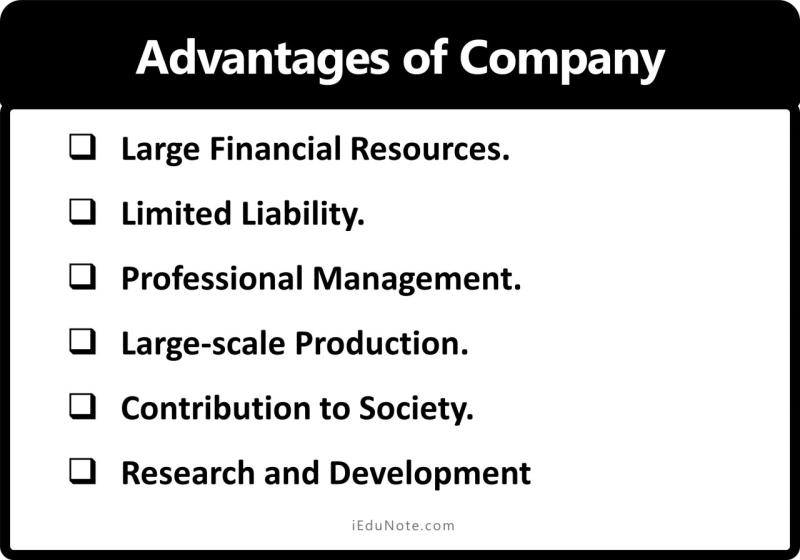What are the advantages of being a corporation?
Certainly! Corporations offer several advantages that make them an attractive business structure for many:
Limited Liability:
Shareholders in a corporation have limited liability, meaning their personal assets are typically protected from business debts and liabilities. If the corporation faces financial issues or lawsuits, the shareholders' personal assets generally cannot be seized to settle corporate debts.
Access to Capital:
Corporations have more options to raise capital compared to other business structures. They can issue stocks and bonds to raise funds, and this ability to attract investment can help with expansion, research, and development.
Perpetual Existence:
A corporation has perpetual existence, independent of its shareholders. Even if shareholders or owners change, the corporation continues to exist. This stability can provide confidence to investors, employees, and customers.
Tax Benefits:
Corporations often benefit from certain tax advantages, including deductibility of business expenses, retirement plans, healthcare, and other benefits for employees. Additionally, corporate tax rates may differ from individual tax rates, potentially resulting in lower taxes for the business.
Credibility and Branding:
Operating as a corporation can enhance credibility with customers, suppliers, and partners. The "Inc." or "Corp." designation after the business name can signal stability and professionalism, which can be beneficial in business dealings.
Employee Incentives:
Corporations can offer various incentives, such as stock options, bonuses, and benefits, to attract and retain talented employees. This can aid in recruiting skilled professionals and incentivizing their performance.
Transfer of Ownership:
Ownership interests in a corporation are easily transferable through the sale of stock. This facilitates the transfer of ownership without disrupting business operations.
Legal Protection:
Corporations often have clearer legal frameworks and structures, offering protection and guidance on governance, compliance, and operational matters.
Access to Resources:
Being a corporation might provide access to a broader network of resources, including networking opportunities, mentoring, and advisory services through industry associations or groups.
While corporations offer these advantages, they also involve complex compliance requirements, higher administrative costs, and more regulatory oversight compared to other business structures like sole proprietorships or partnerships. Deciding on the right business structure should consider the specific needs, goals, and circumstances of the business. Consulting legal and financial professionals is often recommended when making such decisions.
Corporations offer several advantages and benefits to entities or businesses, making them a popular choice for structuring organizations. Here are some of the key advantages of being a corporation:
1. Limited Liability:
One of the most significant advantages of a corporation is limited liability protection for its shareholders. This means that the personal assets of shareholders are generally shielded from the corporation's debts and obligations. In the event of corporate insolvency or lawsuits, shareholders' maximum loss is typically limited to the amount they invested in the corporation.
2. Perpetual Existence:
Corporations have a perpetual lifespan, meaning they continue to exist indefinitely, regardless of the life or death of any individual shareholder or employee. This provides stability and continuity for the business, allowing it to plan for long-term growth and development.
3. Transferable Ownership:
Ownership interests in corporations can be easily transferred through the buying and selling of shares of stock. This allows for greater flexibility in raising capital and facilitating ownership changes. Shareholders can sell their shares to others, and new investors can easily acquire ownership stakes.
4. Access to Capital:
Corporations have access to a wider range of capital sources compared to other business structures. They can raise capital through the issuance of stocks, bonds, and other securities, attracting investment from a broader pool of individuals and institutions.
5. Tax Advantages:
Corporations have a separate legal entity from their owners, allowing them to take advantage of certain tax benefits. For instance, corporations can deduct certain expenses that individuals cannot, such as corporate income tax and employee benefits.
6. Efficient Decision-making:
Corporations generally have a clear organizational structure with defined roles and responsibilities, which can facilitate efficient decision-making and management. The board of directors, elected by shareholders, oversees the corporation's overall direction and strategy.
7. Limited Regulation:
Corporations are subject to less regulatory scrutiny compared to other business structures, such as sole proprietorships or partnerships. This allows for greater flexibility in operations and decision-making.
8. Enhanced Credibility:
The corporate structure is often perceived as more credible and professional, enhancing the business's reputation and facilitating relationships with investors, partners, and customers.
Overall, corporations offer a comprehensive framework for business operations, providing limited liability protection, perpetual existence, transferable ownership, access to capital, tax advantages, efficient decision-making, limited regulation, and enhanced credibility. These advantages make corporations an attractive choice for many businesses seeking to grow, expand, and achieve long-term success.












